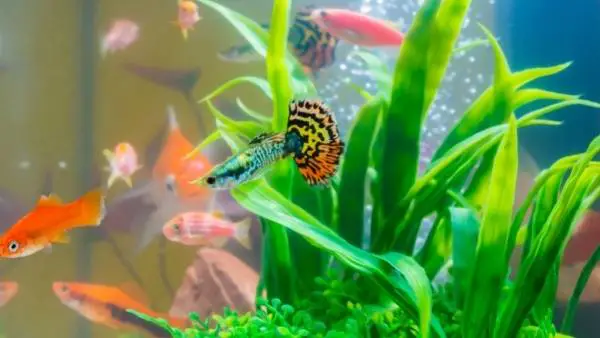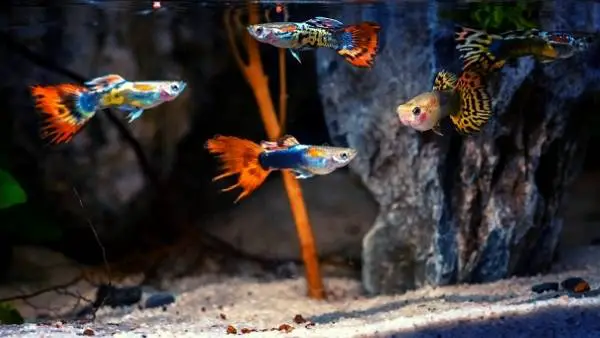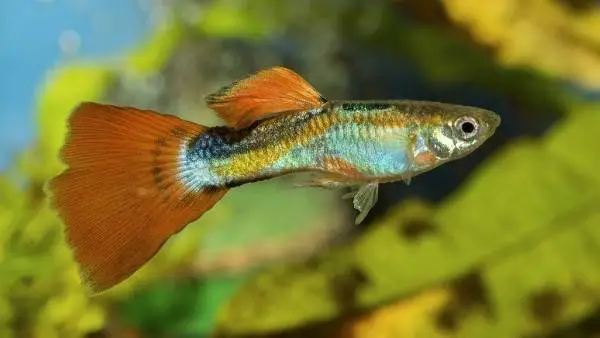Yes, guppies can live in saltwater, despite popular belief. Guppies will tolerate no more than 150% seawater salinity, so, they can live in saltwater but only if you acclimate them properly and set things up correctly.
The amazing thing about guppies, other than their beautiful appearance and calm personalities is their adaptivity - they can live in a plethora of different water conditions and marine environments.

It is tremendously important to provide your guppies with the best living conditions possible, regardless of whether you are keeping them in a freshwater aquarium or saltwater tank.
I have created a video below covering everything in this guide:
Do Guppies Live in Freshwater or Saltwater in the Wild?
In the wild, guppies do not live specifically in freshwater or saltwater, they actually live in brackish water. Brackish water is an odd-sounding marine domain, however, it is the preferred water for plenty of different fish, as well as guppies. The water is a mixture of part saltwater and part freshwater, usually found in swamps and estuaries.
Fortunately, it is pretty easy to replicate this environment in your home aquarium too, should you wish to. Simply follow these tips and tricks, and you will have yourself a brackish water aquarium for your guppies to reside in. It is also important to bear in mind that brackish water is not the same as blackwater, both are totally different aquariums.
How Do Guppies Survive in Saltwater?
Fish that live in saltwater tend to have rather large kidneys, and specialized cells in their gills, which they use to pump out excess salt that their bodies intake. Saltwater fish's kidneys are incredibly important in maintaining the balance of salt within their bodies.
Guppies are livebearers, and, like most livebearers, can tolerate living in any marine water. Having said that, excess amounts of saltwater will certainly do damage to their kidneys.
Another important factor that plays a part in whether or not guppies can survive in saltwater is the conditions they were born and raised in. If your guppies were raised in water containing high mineral concentrations or high salinity, then your guppies will certainly need salt in their water to live a healthy life. However, if they are used to living in water with plenty of minerals, salt is typically not needed.
How to Create a Brackish Water Aquarium
You need to choose a tank that can suitably house brackish water, which is no easy task. Glass and acrylic aquariums are perfect for the job, but make sure you do not use aquariums with metal frames, thermometers, hoods, or any other accessories of a similar nature. You also need to get a hydrometer for measuring the gravity of your tank.
To create this marine environment, you need to take a large bucket filled with enough tap water for your fish tank. If your tap water has a high volume of chlorine, you must condition it before adding marine salt. You will then need to add the correct amount of marine salt per the instructions of the manufacturer.
Obtaining marine salt is easy as it is available in most aquarium shops, pet stores, and online. Avoid purchasing freshwater aquarium salt and also using table salt - both of these are not good options.

Once added, stir the water until the salt has completely dissolved, this will typically take a few minutes but could take longer depending on the volume of water and the temperature. By testing the gravity of the water, you will be able to tell whether or not you have added enough salt, brackish water should be 1.003 to 1.010 in terms of density, but guppies will prefer the lower end of this range. After you have measured the gravity and everything is good, begin to pour the water slowly into your tank.
The final step of the process is to check the tank water gravity, temperature, and pH level before introducing your guppies. The pH level should be between 6.8 to 7.6, with guppies preferring the higher end of the scale (7-7.6).
If you already own a freshwater tank and are looking to convert it into a brackish water aquarium, then you should create the brackish water in a plastic container and then replace 25% of the water in your freshwater tank with the brackish water. Continue this process once a week until your tank reaches the required gravity level.
Ideal Water Parameters
Both water hardness and pH levels are crucial in providing the best water quality possible for your guppies. Additionally, having a heater for your guppies is equally as important. Here are the ideal water parameters for your guppies:
- Temperature: 72-82°F (22-28°C)
- pH Level: 6.8 to 7.8
- Water Hardness: 8-12 dGH
How Much Salt Should You Add To Your Guppy Tank
The amount of salt in your guppy tank is dependent on the size of your aquarium and how much water it can hold. If you follow the rule of one tablespoon of marine salt per 10 gallons of water, you should be fine.
Your tank's water source is also a factor in how much salt it will need. It all depends on how many minerals are in your tank or not in your tank. If your tank water contains minerals, then your water is already saline, meaning that the addition of extra salt is not needed.
Acclimatizing Your Guppies To a Saltwater Aquarium
Guppies are very physically sensitive, which is why it takes them a while to adjust to habitat changes, like most other fish. If your guppies are currently residing in a freshwater aquarium, you will need to slowly drip a small amount of salt into the tank. Make sure to keep your guppies in the brackish water you have created for around one week.

If your guppies are happy and healthy, with no physical or behavioral changes, it means that they have adapted very well to the change in their water. Now you can introduce them to a saltwater aquarium, and saltwater guppy tank mates provided the saltwater meets the requirements mentioned previously.
Conclusion
Guppies are brilliant fish, known for their awesome coloration and hardy nature, which is why they are so good at adapting to different environments. It is incredibly rare to have a fish that can live in three different water environments, but guppies are truly special. It is vital, however, that you make sure their aquarium is perfect for them and that you meet the requirements mentioned in this article. Good luck!

